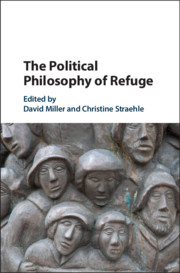Book contents
- The Political Philosophy of Refuge
- The Political Philosophy of Refuge
- Copyright page
- Contents
- Contributors
- Introduction
- Chapter 1 Differentiating Refugees
- Chapter 2 The State’s Right to Exclude Asylum-Seekers and (Some) Refugees
- Chapter 3 Asylum, Speech, and Tragedy
- Chapter 4 Border Rescue
- Chapter 5 Selecting Refugees
- Chapter 6 Refugees and the Right to Remain
- Chapter 7 The Duties of Refugees
- Chapter 8 Is Return the Preferred Solution to Refugee Crises?
- Chapter 9 Refugees and the Right to Return
- Chapter 10 Refugees, Rescue, and Choice
- Chapter 11 Philosophical Foundations for Complementary Protection
- Chapter 12 The Ethics of Sanctuary Policies in Liberal Democratic States
- Bibliography
- Index
Chapter 4 - Border Rescue
Published online by Cambridge University Press: 01 November 2019
- The Political Philosophy of Refuge
- The Political Philosophy of Refuge
- Copyright page
- Contents
- Contributors
- Introduction
- Chapter 1 Differentiating Refugees
- Chapter 2 The State’s Right to Exclude Asylum-Seekers and (Some) Refugees
- Chapter 3 Asylum, Speech, and Tragedy
- Chapter 4 Border Rescue
- Chapter 5 Selecting Refugees
- Chapter 6 Refugees and the Right to Remain
- Chapter 7 The Duties of Refugees
- Chapter 8 Is Return the Preferred Solution to Refugee Crises?
- Chapter 9 Refugees and the Right to Return
- Chapter 10 Refugees, Rescue, and Choice
- Chapter 11 Philosophical Foundations for Complementary Protection
- Chapter 12 The Ethics of Sanctuary Policies in Liberal Democratic States
- Bibliography
- Index
Summary
Every year, thousands of refugees and other migrants die trying to cross borders. The dangers are many. Migrants die from exhaustion crossing deserts, freeze on mountain passes, drown at sea. One way states can save lives is by undertaking rescue operations. This chapter asks whether receiving states have any special duty to do so. The idea of a ‘special duty’ here can be brought out with the following question: Do receiving states owe a duty to rescue migrants at borders that they do not owe all people in need? In answering this question, the chapter starts with an important yet easily overly looked point: crossing borders is not inherently dangerous. Migrants die crossing borders because receiving states restrict migration. This fact, in itself, does not mean that receiving states have a special duty to rescue, but it does mean they cannot claim that border deaths are nothing to do with them. The question we need to ask is whether receiving states bear moral responsibility for border deaths as well as causal responsibility. The chapter goes in search of, and finds, arguments for why receiving states are morally responsible. States cannot treat border deaths like any other misfortune without changing their immigration policies.
- Type
- Chapter
- Information
- The Political Philosophy of Refuge , pp. 78 - 96Publisher: Cambridge University PressPrint publication year: 2019
- 3
- Cited by

